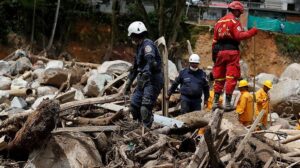by The Cowl Editor on April 6, 2017
Features

by Tait Becker ’19
News Staff
The lives of 254 Colombians have been claimed after a mudslide, followed by torrential rain that tore through many towns in southern Colombia. The most affected area was the province of Mocoa and its surrounding towns, as many rivers in the area began to flood the streets, sending a forceful surge of mud through the area. The storm that caused this widespread damage came in the middle of the night, so many had no idea what was actually happening.
According to The New York Times, one survivor recalled, “People were running and yelling the names of family members. Others were screaming at God.”
A state of emergency was declared earlier this week by President Juan Manuel Santos as resources and available personnel are both quickly diminishing. The number of deaths continues to rise as more rubble is uncovered from the mud.
Many have argued that this disaster, along with the widespread flooding also occurring in Peru, is a result of climate change in the region. Furthermore, several leaders have spoken in favor of continuing and expanding the conversation on climate change in the hemisphere. Climate change, which has been indicated by heavy rain and potentially caused by high levels of deforestation, has begun to make many communities extremely vulnerable to further natural disasters.
While this is a topic that will continue to be at the forefront of hemispheric security concerns, the situation in Mocoa continues to deteriorate with each passing day.
Water, supplies, food, and medical equipment have been cut by the mudslide. The Red Cross has been working to try and transport these essentials to the community; however, the isolated and mountainous location has created complications in accessibility. The latest hardship that the community has faced is the lack of room to store the deceased bodies, which are beginning to pile up in the streets. “You smell it for hundreds of feet,” one observer noted. “There are people who faint when they open the bags and the bodies are putrefied.”
Any assistance in the form of food or labor is greatly appreciated as rescue volunteers continue to work day and night to help those affected by this disaster.